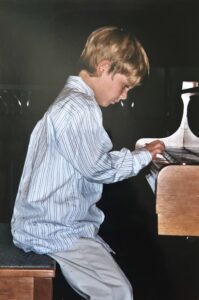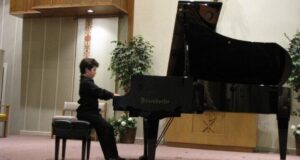
Lesson Types
- 30 minute private lessons. Ideal for most beginner students, with customized content to meet your unique goals and needs.
- 45 Minute Private Lessons. Recommended for older beginner, or a student that has progressed to late elementary –intermediate level and is comfortable to take in more information.
- 45 Minute Semi-Private Lessons: These fun interactive lessons are most suitable for two siblings aged 5-7. Enjoy a sibling discount with this package.
- Adult Students Lesson Package. This package is designed to accommodate adult learners with a busy schedule. I offer a prepaid block of 8 lessons that offers some flexibility in scheduling, so adult student can enjoy the freedom to learn at a pace that suits them best.
- Young Beginner Mini Group Lessons: For children aged 4-5. These lessons are designed to introduce young learners to the world of music and awaken their interest in learning to play piano.
- Online Lessons. I offer virtual lessons on Zoom, or Face Time. These lessons allow students to get piano instruction with a computer, or a tablet in the comfort of their own home, or anywhere in the world. Whether you’re traveling, or feel “under the weather”, or just prefer the convenience of virtual lessons, I am here to help you achieve your musical goals.
What you get
- Exclusive reserved lesson time each week.
- Curriculum that is tailored to each student’s current technical abilities, goals, and musical interests.
- Comprehensive instruction in the fundamentals of music notation, theory, ear training, composition, music history, ensemble skills, and more.
- Studio practice incentives and awards to encourage students to practice and grow.
- Educational games that reinforce concepts learned in lessons.
- Access to practice and theory apps to supplement learning and practice.

Performances
- All students have the chance to perform at two annual recitals.
- Opportunities to participate in local, state, and national music competitions.
- Access to world-class performing artists, master classes, camps, festivals, and conventions to expand musical knowledge and horizons.
- Audition preparation for All-State & County Honor Band & Orchestra, Youth Orchestra, College, and more!
Keys to Success
Learning to play the piano can be a rewarding and fulfilling journey, but it requires dedication, patience, and the right approach. Here are five important keys to success in learning piano:
Consistent Practice: Regular and consistent practice is the foundation of progress in piano playing! Set aside specific practice times each day and stick to them. Consistency helps build muscle memory, improve finger dexterity, and enhance your overall technique. Start with shorter practice sessions if needed and gradually increase the duration as your skills improve.
Effective Goal Setting: Set clear and achievable goals for your piano learning journey. These goals could be short-term, like mastering a specific piece or technique, or long-term, such as playing a challenging composition. Having well-defined goals helps you stay motivated and provides a sense of direction. Break down larger goals into smaller milestones, celebrating each achievement along the way.
Quality Guidance: Whether through private lessons, online tutorials, or educational resources, receiving quality guidance is crucial. A skilled piano teacher can provide personalized feedback, correct your technique, and guide your progress. If formal lessons aren’t feasible, make use of online tutorials, sheet music, and instructional videos. However, be sure to choose reliable sources to ensure you’re learning the right techniques.
Patience and Persistence: Learning the piano is a gradual process that requires patience. You won’t become a virtuoso overnight. Expect to encounter challenges, especially with more complex pieces or techniques. Don’t get discouraged by initial difficulties; instead, embrace them as opportunities to grow. Persistence in the face of challenges will ultimately lead to breakthroughs and improvements.
Mindful Practice and Technique: Mindful practice involves focusing your attention on the task at hand, paying attention to each note, rhythm, and finger movement. Avoid mindless repetition, as it can reinforce mistakes. Break down challenging passages into smaller segments and practice them slowly, gradually increasing the tempo as you gain control. Additionally, develop proper piano technique from the start to prevent bad habits that can hinder your progress later on.
Remember that learning the piano is a journey, and the joy of music-making should remain at the forefront of your efforts. Embrace the process, celebrate your achievements, and don’t hesitate to seek inspiration from accomplished pianists. By incorporating these keys to success into your learning approach, you’ll be well on your way to becoming a skilled and confident piano player.
Power of Three
Collaboration between a teacher, a parent, and a student is like a superpower for successful piano learning.
Imagine the teacher as the piano superhero who knows all the cool tricks and tips to play the piano. The parent is like the sidekick, helping to make a strong plan and cheering the student on. And the student is like a brave explorer, learning and practicing the piano magic. When these three team up, amazing things happen! The teacher guides the student, showing them the right path to piano greatness. The parent joins in by making sure the student practices, reminding them of their goals, and giving lots of support and encouragement. Together, they make a dream team that helps the student play those tricky tunes, overcome challenges, and celebrate sweet successes.
When teacher, parent, and student work together, the piano power of three can create musical wonders!
The Importance of Using a Quality Piano for Practices
Frequently, parents make the mistake of letting their children begin lessons on an inadequate instrument or portable keyboard; they wait to determine if their child will continue with lessons and see if they will “stick with it”. But before long your child will be able to notice the difference between full, clear tone and dull inconsistent tone. Students recognize the limitations of keys that do not respond properly and make it difficult to accomplish the teacher’s requests. If an instrument does not feel or sound right, unnecessary frustration may spread to disenchantment with music in general.
Children take great pride in their pianos and become attached to them. A good piano reinforces the value of piano lessons and encourages a child to succeed. The very appearance of a poorly maintained piano can be discouraging to a child. When you buy a good piano, your child will be able to enjoy it throughout his or her lifetime.
In order for a beginning piano student to develop a beautiful tone, even touch, balanced dynamics, clear pedaling, and a solid technique, a quality piano or a digital piano with a weighted hammer action is recommended. Keyboards are discouraging and not recommended because of limitations in key size, key dip, pedal options, and a non weighted touch. Imagine taking tennis lessons with a ping pong paddle! There are few things more discouraging than practicing on an inadequate instrument.
The point is clear: If your child is to learn to play an instrument and be successful, he must begin on a good instrument. The end depends upon the beginning.
GUIDELINES AND POLICIES
The following guidelines and policies have been established to ensure a warm, friendly and professional relationship between us. It is modeled after the policy set forth by the Music Teachers Association of California (MTAC). It is that you will take your piano training seriously and that this policy will help us attain our objectives.
My goal is to develop the student’s full music potential with individualized instruction by providing performance opportunities, balanced repertoire, progressive technique, music theory and most importantly, a love of music. I am very concerned about student progress, and I want the time we spend together to be positive as well as fun. Please let me know of any concerns or questions you may have throughout the year.
THE PROGRAM
The studio offers private piano lessons at my home as well as online. The scheduled lessons for this school year are September through June. Lessons in July and August are by appointment.
THE TUITION
The lesson fee is payable in 10 equal monthly installments. Payment is due in advance on the first lesson of each month. Please make checks payable to: Zarema Seymour. All scheduled lessons must be paid for. Credit is not given to a student who cannot attend his/her lesson(s) for any reason. This is a policy of the Music Teachers Association of California of which I am a member.
Fees throughout the year
Tuition – please inquire for rates
Festivals, competitions, tests – fees set forth by the MTAC
THE LESSONS
The time of your lesson has been reserved for you and only you. This means that this time is unavailable to any other student and I have the commitment to instruct you at that time. Do not schedule sports activities, other lessons, or any other appointment during your scheduled lesson time. Lessons will not be extended for a student who is not ready to begin on time. All scheduling changes are completely at my discretion.
THE MAKE-UP POLICY
For private (individual) lessons:
A maximum of four make-up lessons per year (two per each semester) are available only for students who have given 24 hours notice. Students who have missed due to illness or other extreme circumstances are the only ones who are considered for a make-up. If a lesson is forgotten, it will not be made up. If there is an opening in my schedule, every effort will be made to fill the time.
Exception:
If your child becomes ill overnight or comes home sick, call right away and we can schedule a makeup.
THE STUDIO ENVIRONMENT
Please enter quietly a few minutes before the instruction begins. Have your books ready. Please respect each other’s time. Do not interrupt someone else’s lesson for any reason. Parents, if you have a question to ask, please ask at the beginning or during your child’s lesson time, not during another student lesson time. Please do not drop off your child without acknowledgment from them or me that they are safe. Never assume that the studio is open all day or will stay open earlier or later than the scheduled lesson time. Please respect my neighbors by not honking your horn when retrieving your child. Students are asked to stay inside until the pick-up person is visible. For online classes, the student needs a quiet environment.
CAR PARKING
To avoid complains from my neighbors, I ask you to park your car on my driveway, or on the street in front of my house.